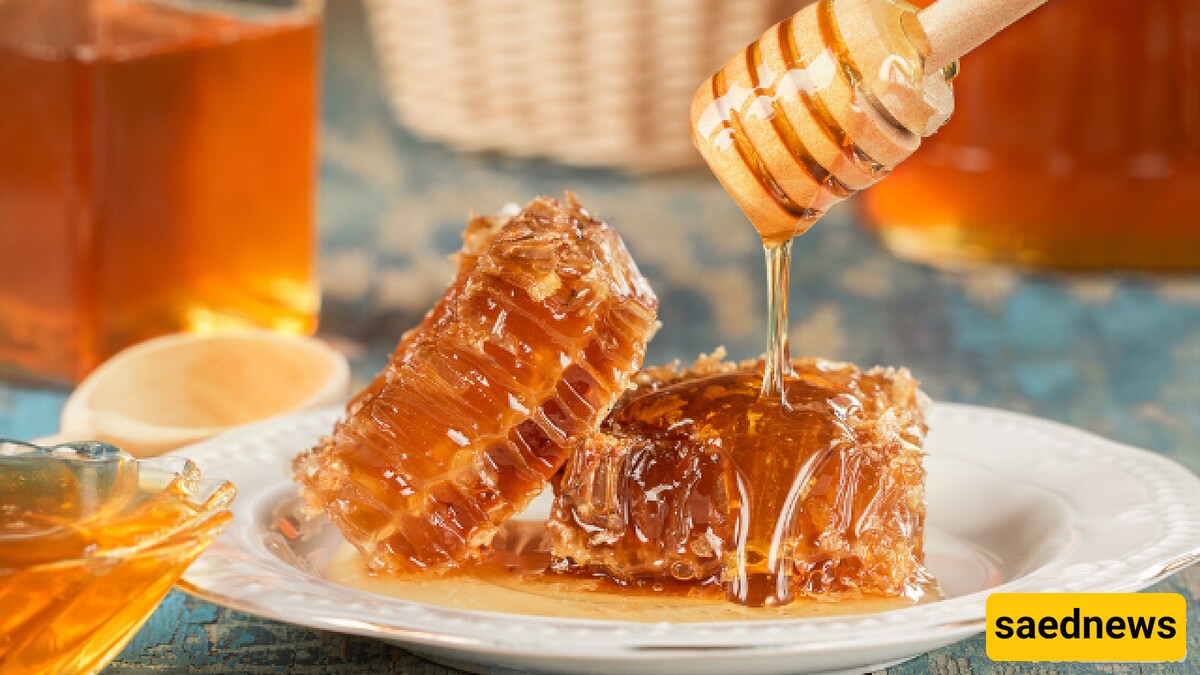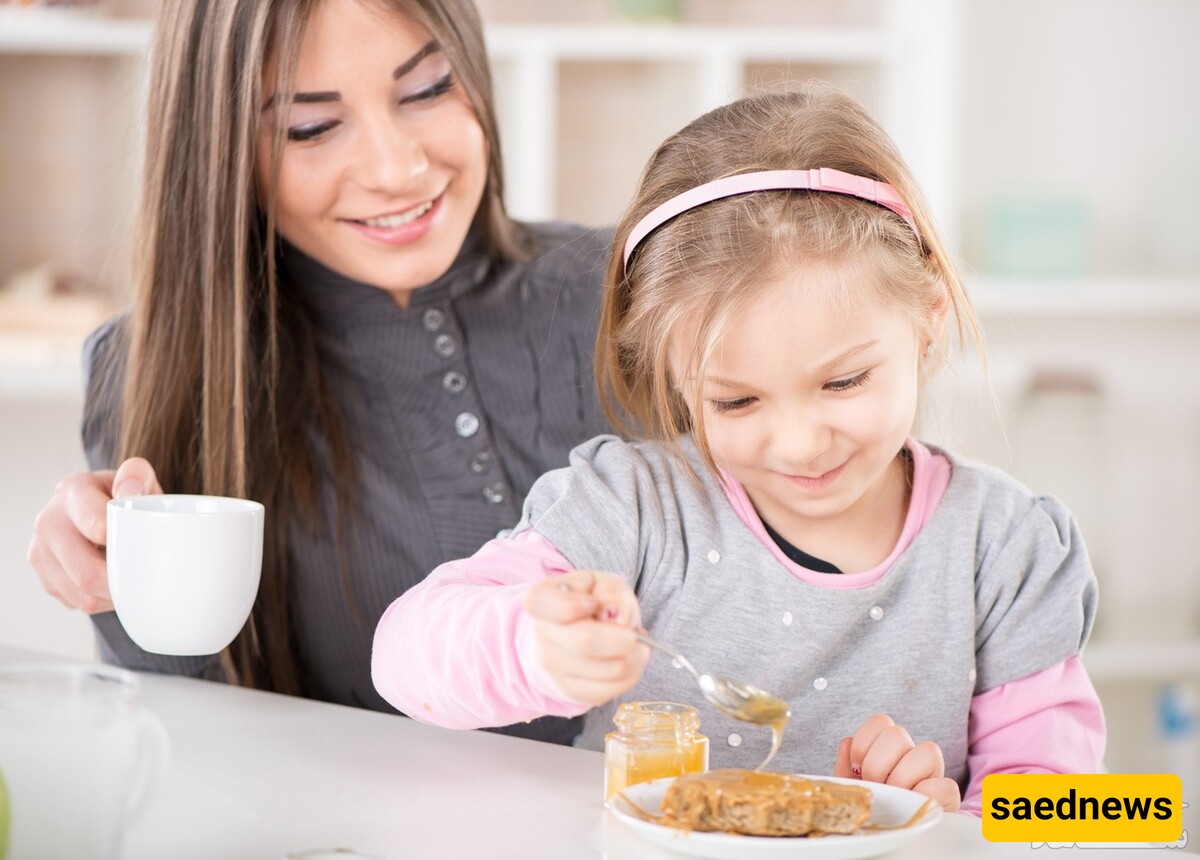Honey is very beneficial for children, and everyone knows that this natural element has numerous properties. Honey, which is extracted from nectar, is one of nature’s greatest gifts and can contribute to a child’s health in many ways. Stay with us as we explore the health benefits of honey for children.

Doctors strongly recommend incorporating honey into the diet of children over the age of one to promote their health. By following proper nutritional guidelines and special precautions, an appropriate amount of honey should be included in a child's daily diet. Honey has a warm and dry nature, making it beneficial for children throughout the year, especially in cold seasons. This extraordinary natural remedy provides a high level of energy to a child's body and helps treat illnesses caused by cold temperatures.

Although the composition of honey largely depends on its botanical source (the type of plant the bee has collected nectar from), natural honey generally contains enzymes, amino acids, minerals, and antioxidants. It also includes vitamins B and C.
Below is the summarized nutritional value of 339 grams of honey:
Protein: 1g
Water: 58mg
Calcium: 233mg
Magnesium: 6.8mg
Potassium: 176mg
Zinc: 0.7mg
Fiber: 7g
Energy: 34 kcal
Sugar: 278g
Vitamin C: 1.7mg
Vitamin B3: 0.4mg
Due to its high mineral content, honey has countless benefits for children. It can be incorporated into various recipes or consumed directly as a standalone food.
Monitoring the vitamins and calories a child consumes daily helps in planning a balanced diet that provides essential nutrients for their physical and mental growth. Natural honey contains a suitable amount of calories, protein, carbohydrates, antioxidants, and magnesium. Additionally, it includes vitamins A, B, C, D, and E, as well as zinc, potassium, phosphorus, copper, and lactic acid, all of which contribute to strengthening a child's body. Other important minerals found in honey, such as calcium, iron, sodium, and manganese, are essential for children's growth and development.
The proteins, carbohydrates, and high-calorie content in honey provide the energy needed for children's daily activities, including sports and play. Therefore, honey should be a routine part of breakfast or a delightful snack. Additionally, the iron in honey helps prevent anemia by supporting bone marrow function in producing red blood cells. A lack of iron can lead to weakness and fatigue.
Children who consume nutritious and healthy foods are generally healthier than their peers. They have stronger immune systems, higher physical endurance, and greater enthusiasm for sports and play. Proper nutrition supports physical, mental, and cognitive development, ensuring that children grow up to be healthier adults.
Mothers often worry about enhancing their child’s intelligence and cognitive abilities from the prenatal stage. A well-planned diet can help improve a child's mental performance. The phosphorus and beneficial calories in honey contribute to increased brain power. Instead of artificial sugars, try adding high-quality honey to pancakes and other favorite foods. Honey meets the essential dietary needs of children, making it an excellent alternative to processed sugars.
This method also encourages children to consume honey with enthusiasm, replacing vitamin-deficient snacks with a nutritious treat. By creatively incorporating honey into daily meals, parents can enhance their child’s intelligence and memory.
All parents want to strengthen their child's delicate immune system with delicious and nutritious foods that protect them from acute and chronic diseases. Instead of consuming harmful foods like sugary drinks and fast food, focus on the key benefits of honey. The antioxidants and polyphenols in honey boost the immune system by strengthening white blood cells, which act as a defense against external threats.
To further enhance immunity, children should consume honey along with nutrient-dense nuts such as almonds, hazelnuts, and pistachios. Drinking milk, herbal teas, and fortified beverages mixed with honey increases its antibacterial properties.
Parents care about their child’s skin and hair health. During childhood, honey can be used to treat skin conditions such as dryness, inflammation, and wounds. Applying a honey mask can help hydrate dry skin. Additionally, consuming honey as part of a daily diet ensures a steady intake of vitamins for healthy hair growth.
Weekly application of honey-based masks offers the following benefits:
Deep hydration for the skin
Regulating the natural oils in skin and hair
Providing essential vitamins for soft, vibrant skin and thick, strong hair
Strengthening hair follicles, reducing hair loss
Preventing split ends, scalp flaking, and dandruff
Incorporating honey into a child's routine is a natural way to enhance their skin and hair health.
Poor nutrition and excessive consumption of unhealthy foods can deprive the body of essential vitamins. If dietary habits are not corrected early, children may experience weight gain without muscle strength. Processed snacks interfere with proper vitamin absorption.
To support muscle and bone growth, do not overlook the benefits of honey for children. Incorporate one to two teaspoons of honey daily into desserts and beverages in ways that appeal to the child’s taste.
The minerals and organic compounds in honey contribute to balanced weight gain and increased muscle endurance. The natural sugars in honey help regulate blood sugar, cholesterol, fat levels, and blood pressure, preventing health complications.
Honey is a common natural remedy for sore throats. It has been used in Ayurvedic and traditional medicine to relieve throat pain. Many families use honey as a substitute for cough syrup to treat colds and coughs in children effectively.
For children suffering from stomach pain, honey can be a natural alternative to chemical medications. It helps soothe pain and boosts metabolism.
Drinking tea with honey aids digestion and alleviates stomach discomfort, making the child feel better.
Mouth ulcers can be painful for children, making it difficult for them to eat. Applying a mixture of honey and turmeric inside the mouth speeds up the healing process and relieves pain and discomfort.
Honey is beneficial for children with asthma, particularly nighttime asthma attacks. The enzymes in honey support the respiratory system, improving breathing. If your child suffers from asthma, incorporating honey into their diet can help.
A study comparing two groups of children (one consuming natural honey and the other consuming sugar) yielded the following results:
Children who consumed honey had higher red blood cell counts and better weight gain.
Those fed honey had better hemoglobin production and clearer skin.
Because honey consists of monosaccharides (simple sugars), it is better tolerated by infants compared to refined sugar.
Children who consumed honey cried less and had better overall health.
Compared to sugar-fed children, those who ate honey gained more weight and vomited less frequently.
Honey-fed children were less prone to illnesses due to higher red blood cell production.
Honey improved digestion in children by supporting beneficial stomach bacteria.
Mixing milk with honey resulted in faster weight gain and fewer digestive issues in infants.
Consuming honey increased calcium levels, leading to healthier skin and a more vibrant complexion.
Despite its numerous benefits, honey should not be given to infants under 12 months due to the risk of Clostridium botulinum contamination, which can cause botulism in infants. Older children can safely consume and digest honey.
Key symptoms of botulism include:
Weakness
Poor appetite
Constipation
Lethargy
Breathing difficulties (in severe cases)
If these symptoms appear within 12 to 36 hours after consuming honey, seek medical attention immediately.

